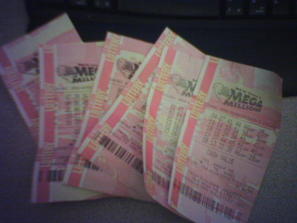
On one side was Mega Millions — the almost unfathomable fortune that, as I write this, was to be divided evenly between two as-yet unidentified winners.
On the other side was Cecil Williams, a 60-year-old Brooklyn resident who relies on his guide dog, Orlando,
| | because he is blind. Tuesday morning, while standing on a subway platform, Williams became dizzy and fell onto the tracks. Witnesses said Orlando did everything he could to rescue his fallen master from an oncoming train, to no avail. Finally, the dog jumped onto the tracks and sat in front of Williams, as if to guard him. People on the platform either ran for help or yelled at Williams to lie down in the trough between the tracks. In the nick of time, both Williams and Orlando obeyed. Neither was seriously injured when the train came to a stop above them. But the story didn’t end there. While Williams and Orlando were recovering together in a hospital, reporters learned that Orlando was about to be retired as a guide dog. Insurance no longer would cover Williams’ cost of keeping his loyal protector. Once word got out, donations started coming, with New Yorkers quickly giving enough to make sure Williams can take care of Orlando for life. Years ago, as a cub reporter for United Press International in New York City, I covered a New York lottery press conference. A lottery official, sensing my youth and inexperience, kept trying to tell me I looked like a lucky person and ought to buy a ticket. Fortunately, I was not as gullible as I must have looked, but I have never forgotten the false note of his compliments. What hopes does the lottery offer? The website webmath.com explains it well. To understand your odds of winning a big jackpot, get a rope that is about 150 feet long and lay it in a circle so the two ends meet. Then take a tiny grain of sand and place it anywhere within that circle. Next, have someone spin you around to disorient you. Then take another tiny grain of sand and drop it from a height of about a foot. Your odds of striking the first grain of sand with the second are about equal to winning when the odds are 1 in 200 million. Two people may have hit those grains of sand this week, but millions more got nothing. And yet millions will continue to pay more for that one hope. A lottery ticket or a donation to help a blind man keep his dog — which offers the better payoff? There are other contrasts out there worth examining. On one side are the many reports of violence associated with Black Friday deals, which were available on Thanksgiving Day this year in many parts of the country. One person was shot in the leg over a television. Police had to evacuate a Walmart. A woman spit on a child in a fight over baby clothes. On the other side are layaway angels who anonymously retire the debts of strangers at retail stores. As the recent lottery frenzy neared its climax, I heard a woman tell a radio interviewer that if she won she would give to charity. While this is a noble thought, it is important to remember that the Prince of Peace, whose birth will be celebrated this week, never possessed much in the way of money, and yet he was the most charitable of all. He offers a hope with eternal significance that is freely available to all who will embrace it. He cautioned us to treasure up things of lasting value. Reuters published a photo showing a police officer hugging Williams, the blind man, who was sitting in a wheelchair, his left arm petting Orlando. "The spirit of giving, Christmas and all that there – it exists here, and it’s in New York," I heard him say to ABC radio. The contrasts seem so stark. Why, this time of year, can’t more people see it? |

 RSS Feed
RSS Feed

